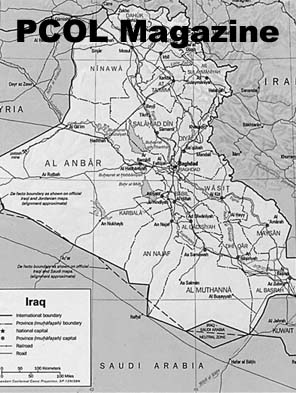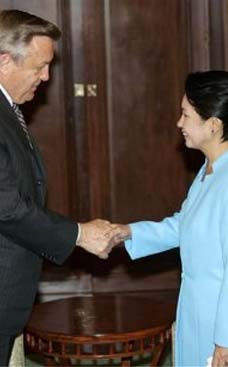
The U.S. military that went into Iraq in 2003 was the best military in the world for fighting another military. But it was woefully unprepared for the task at hand. For example, U.S. military culture believes in bringing overwhelming force to bear. Yet classic counterinsurgency doctrine calls for using only the minimal amount of force necessary to get the job done. U.S. soldiers and their commanders, untrained and unschooled in the difficult art of counterinsurgency, tended to improvise. So in the summer of 2003, some soldiers in Baghdad decided that the best way to deter looters was to make them cry--and they sometimes did this by threatening to shoot the children of looters, and even conducting mock executions.
Thomas E. Ricks says: In Iraq, there was a tiny minority of American soldiers early on who understood how to win the occupation. These generally were civil affairs officers and other Special Forces types.
Amazon.com: As military correspondent for the Post, you have made five trips to Iraq over the last four years. How has it changed over that time?
Thomas E. Ricks: It has been markedly worse each time, in terms of security. On my first trip, in April-May 2003, we would walk out on the streets of Baghdad at night, albeit with caution. Even on my second trip, in the summer of 2003, I would feel comfortable hopping in a car and driving 100 miles north from Baghdad to Tikrit. To do either of those things now would be suicidal. In January and February of this year, Baghdad felt worse to me Mogadishu did when I was there in 1993 or Sarajevo did when I was there a few years later. It appeared to me that there was no security, except what you provided for yourself with armed men and careful planning. One Army major described the city to me as being in "the pure Hobbesian state" in which everybody is fighting everybody.
By the way, contrary to what I see asserted occasionally, most reporters don't live in the Green Zone, the walled-off area in central Baghdad that is the headquarters of the American effort in Iraq. Reporters live out in the city, and I think generally have a better feel for what is going on than do people living in the Zone or on big American military bases. In the area of Baghdad I stayed in, I constantly heard gunfire and explosions. Yet an American colonel told me that my neighborhood was deemed "secure." I think that really meant that U.S. troops could drive through it while heavily armed--say, with a .50 caliber machine gun atop a Humvee--and usually not be attacked.
I worry that what the Americans measure are threats to U.S. troops and the killings of Iraqis. That neglects a huge spectrum of other significant activities--rapes, robberies, kidnappings, acts of extortion, and, most importantly, acts of violent intimidation.
Amazon.com: You cite many strategic errors in the planning and execution of the war, but perhaps the central one is that the U.S. military leadership failed to recognize that they were fighting an insurgency, and their methods of fighting in fact helped to create that insurgency. Can you explain those methods, and their effects?
Ricks: The U.S. military that went into Iraq in 2003 was the best military in the world for fighting another military. But it was woefully unprepared for the task at hand. For example, U.S. military culture believes in bringing overwhelming force to bear. Yet classic counterinsurgency doctrine calls for using only the minimal amount of force necessary to get the job done. U.S. soldiers and their commanders, untrained and unschooled in the difficult art of counterinsurgency, tended to improvise. So in the summer of 2003, some soldiers in Baghdad decided that the best way to deter looters was to make them cry--and they sometimes did this by threatening to shoot the children of looters, and even conducting mock executions.
More broadly, the Army in the fall of 2003 fell back on what it knew how to do, which was conduct large-scale "cordon-and-sweep" operations. These missions scarfed up thousands of Iraqis, most of them fence-sitting neutrals, and detained them. U.S. military intelligence officials later concluded that 85% of those detained were of no intelligence value. The detention experience frequently was humiliating for Iraqis, a violation of another key counterinsurgency principle: Treat your prisoners well. (Your readers who want to know more about this should read a terrific little book by David Galula titled Counterinsurgency Warfare: Theory and Practice.)
Not every unit was ineffective or counterproductive. I was struck at how successful the 101st Airborne was in Mosul in 2003-04. And some units showed remarkable improvement--the 3rd Armored Cavalry Regiment had a mediocre first tour of duty in Iraq, but when it went back in 2005 for a second tour, it did extremely well. Col. H.R. McMaster, the regimental commander (and author of a very good book about the Vietnam War, Dereliction of Duty) told his troops that, "Every time you disrespect an Iraqi, you are working for the enemy." I was especially struck by how his regiment handled its prisoners--it even had a program called "Ask the Customer" that quizzed detainees when they were released about whether they felt treated well. This recognized the lesson of past wars that the best way to end an insurgency is to get its leaders to put down their guns and enter the political system, and to get the rank-and-file to desert or switch sides. But it will be harder to discuss the sewage system with the new mayor next year if your troops beat him in his cell when he was your prisoner last year.
Amazon.com: But today's military leadership was formed in Vietnam, when all of those lessons of counterinsurgency were supposedly learned before. Why didn't that experience translate into a preparation for the current conflict?
Ricks: Military experts, such at Andrew Krepinevich (The Army and Vietnam) and Lt. Col. John Nagl (Learning to Eat Soup with a Knife) say that after that war ended, the Army washed its hands of the entire experience and essentially concluded that it was never going to do anything like that again. It was almost as if the very word "counterinsurgency" was banned from official Army discourse.
In Iraq, there was a tiny minority of American soldiers early on who understood how to win the occupation. These generally were civil affairs officers and other Special Forces types. But their wisdom often was disregarded. "What you are seeing here is an unconventional war being fought conventionally," one Special Forces lieutenant colonel glumly commented one day in Baghdad.
Amazon.com: You've been writing about the military for the Post and the Wall Street Journal for years now, and Fiasco is built from the testimony of a remarkable array of sources up and down the chain of command, some off the record but many more on the record. Can you talk about your sources? Is this level of public criticism of a war from within the military precedented??
Ricks: Yeah, reporting the book was a pretty emotional experience. Even having covered this war as it unfolded, I was taken aback by the rage that some officers felt toward the Bush Administration, and especially toward Defense Secretary Rumsfeld. And also toward Paul Wolfowitz, who was then the no. 2 guy at the Pentagon. I think the rage is probably like what the military felt about Robert McNamara during the Vietnam War. What is unprecedented, I think, is that many officers had doubts about the wisdom of invading Iraq, especially in the way we did it.
The emotions also hit me pretty hard at times, especially when I was writing my chapter 13, about how widespread abuse was by American soldiers in 2003-04, often because they hadn't been trained for the mission they faced. I have spent more than 15 years covering the military. I tend to like and admire these people. So when I learned about a 4th Infantry Division soldier shooting an unarmed, handcuffed Iraqi detainee in the stomach, and the investigating MPs saying the soldier should be charged with homicide, and instead the commander simply discharged the soldier from the Army--well, that bothered me.
Another thing that struck me with sources was the mountain of information that was available. I read over 30,000 pages of documents for this book. At the end of one interview a guy gave me a CD-ROM with every e-mail he had sent to Ambassador Bremer, who ran the civilian end of the first year of the occupation. Other people showed me diaries, unit logs, official briefings, and such. Also the ACLU did a great job of obtaining and releasing piles of official U.S. military documents related to abuse--so I could see the time stamp on an e-mail in which an intelligence officer stated that "the gloves are coming off" in interrogations, and one soldier recommended blows to the chest while another wrote back recommending low-level electrocution.
Unfortunately the Army wouldn't release the details of citations for valorous acts by soldiers, which means that the Pentagon made it easier for me to learn about the sins of soldiers than about their acts of bravery. The Marine Corps did give me those "narratives" that support the bestowing of medals, which I really appreciated. Those documents really brought home to me the fierceness of the two Battles of Fallujah, in April and November 2004--probably the toughest fighting American troops have seen since Hue and Khe Sanh in the Vietnam War.
Amazon.com: In the last section of the book, you project a variety of possible scenarios for the next 10 years in the Middle East, mostly grim ones, and just in the past two weeks the sudden violence between Israel and Hezbollah in Lebanon is leading to talk of a wider regional conflict. Where do you think those events are leading us?
Ricks: We are really in unexplored territory. We are carrying out the first-ever U.S. occupation of an Arab nation. This is also almost the first time we have engaged in sustained combat ground war with an all-volunteer force. (I think the suppression of the Philippines insurrection might count as a small precedent.)
Even more significantly, I think the Bush Administration doesn't really like "stability" in the Middle East. In its view, "stability" has been the goal of previous administrations, but pursuing it led to 9/11. It is not the goal, it is the target. So they are for rolling the dice, both in Iraq and in Lebanon. I think the big worry is those wars spilling over borders. Fasten your seat belts.




















